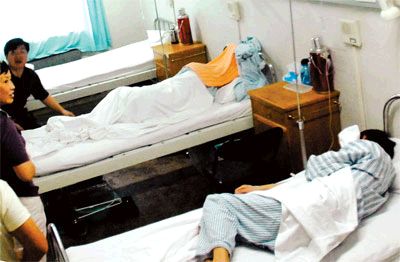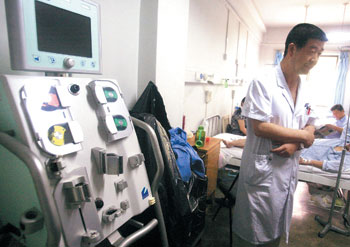| Home / China / Local News | Tools: Save | Print | E-mail | Most Read |
| Chemical Plant Sold Toxic Thallium to Student |
| Adjust font size: |
The college student who poisoned 3 classmates with thallium nitrate revealed that he purchased the poison from a chemical plant in Sichuan Province, Jiangsu police revealed yesterday. The student, surnamed Chang, a freshman at the China University of Mining and Technology (CUMT) based in Xuzhou City, Jiangsu Province, was arrested by local police on June 12. He confessed to purchasing 250 grams of thallium nitrate via the Internet from a plant in Sichuan on May 22. On May 29, he injected around 2 ml of thallium into each drinking cup of three classmates. In the evening, the three students fell gravely ill after drinking water from the poisoned cups. The rest of the thallium was recovered from Chang's classroom after his arrest. CUMT Vice President Wang Jianping had good news to give at a press conference yesterday, saying, "All the students are in stable condition and recovering well and will leave hospital in a few weeks."
Wang Jianping, vice president of China University of Mining and Technology (CUMT) based in Xuzhou City, Jiangsu Province, on Wednesday afternoon briefed the press on the poisoning case. (photo from the campus website)
One student, surnamed Niu, currently receiving treatment in Shijiazhuang, capital of Hebei Province, is now able to walk by himself and ingest liquids. Chief Physician Lu Shijun said that Niu had been suffering from hair loss and vomiting when first admitted, but that they had subsided as he began recovery. Thallium poisoning is very rare, thus a clear treatment path is unavailable. According to Hao Fengtong, director of Beijing Chaoyang Hospital's Occupational Disease Department, where the other two students, Liu and Shi are hospitalized, the thallium level in their bodies has dropped to around 100 times higher than normal from 1000 through receiving double hemo-perfusion. Beijing Youth Daily reported that one of the two had lost around 2/3 of his hair, with the other shedding 1/5 of it. "Two or three months of recovery will be needed for a good result," said Hao, adding that hair loss was a typical symptom of thallium poisoning.
"Xuzhou Police has dispatched a team to the chemical plant in Sichuan to investigate the conditions of the thallium sale, but their findings will take time," Zhang Maoping, director of Publicity Department of CUMT told China.org.cn. He refuted previous media reports that the poison may have been stolen from the university labs due to the heavily-restricted uses of thallium. He also denied that the canteen where the four students dined was shut down for safety reasons. Operating under the initial belief in a food poisoning scare, the canteen was closed for check-ups but no other similar cases were found in other students. Later, tests carried out at the Jiangsu Provincial Center for Disease Control and Prevention came back negative. The university is now conducting a thorough sweep of all canteens and snack shops to eliminate all risk of food poisoning. (China.org.cn by staff reporter Zhang Yunxing, June 21, 2007) |
| Tools: Save | Print | E-mail | Most Read |
 |
| Related Stories |
|



